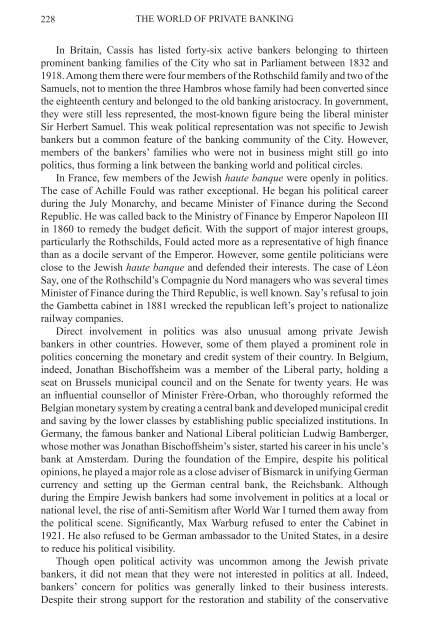the world of private banking
the world of private banking
the world of private banking
Create successful ePaper yourself
Turn your PDF publications into a flip-book with our unique Google optimized e-Paper software.
228<br />
THE WORLD OF PRIVAtE BANKING<br />
In Britain, Cassis has listed forty-six active bankers belonging to thirteen<br />
prominent <strong>banking</strong> families <strong>of</strong> <strong>the</strong> City who sat in Parliament between 1832 and<br />
1918. Among <strong>the</strong>m <strong>the</strong>re were four members <strong>of</strong> <strong>the</strong> Rothschild family and two <strong>of</strong> <strong>the</strong><br />
Samuels, not to mention <strong>the</strong> three Hambros whose family had been converted since<br />
<strong>the</strong> eighteenth century and belonged to <strong>the</strong> old <strong>banking</strong> aristocracy. In government,<br />
<strong>the</strong>y were still less represented, <strong>the</strong> most-known figure being <strong>the</strong> liberal minister<br />
Sir Herbert Samuel. This weak political representation was not specific to Jewish<br />
bankers but a common feature <strong>of</strong> <strong>the</strong> <strong>banking</strong> community <strong>of</strong> <strong>the</strong> City. However,<br />
members <strong>of</strong> <strong>the</strong> bankers’ families who were not in business might still go into<br />
politics, thus forming a link between <strong>the</strong> <strong>banking</strong> <strong>world</strong> and political circles.<br />
In France, few members <strong>of</strong> <strong>the</strong> Jewish haute banque were openly in politics.<br />
The case <strong>of</strong> Achille Fould was ra<strong>the</strong>r exceptional. He began his political career<br />
during <strong>the</strong> July Monarchy, and became Minister <strong>of</strong> Finance during <strong>the</strong> Second<br />
Republic. He was called back to <strong>the</strong> Ministry <strong>of</strong> Finance by Emperor Napoleon III<br />
in 1860 to remedy <strong>the</strong> budget deficit. With <strong>the</strong> support <strong>of</strong> major interest groups,<br />
particularly <strong>the</strong> Rothschilds, Fould acted more as a representative <strong>of</strong> high finance<br />
than as a docile servant <strong>of</strong> <strong>the</strong> Emperor. However, some gentile politicians were<br />
close to <strong>the</strong> Jewish haute banque and defended <strong>the</strong>ir interests. The case <strong>of</strong> Léon<br />
Say, one <strong>of</strong> <strong>the</strong> Rothschild’s Compagnie du Nord managers who was several times<br />
Minister <strong>of</strong> Finance during <strong>the</strong> Third Republic, is well known. Say’s refusal to join<br />
<strong>the</strong> Gambetta cabinet in 1881 wrecked <strong>the</strong> republican left’s project to nationalize<br />
railway companies.<br />
Direct involvement in politics was also unusual among <strong>private</strong> Jewish<br />
bankers in o<strong>the</strong>r countries. However, some <strong>of</strong> <strong>the</strong>m played a prominent role in<br />
politics concerning <strong>the</strong> monetary and credit system <strong>of</strong> <strong>the</strong>ir country. In Belgium,<br />
indeed, Jonathan Bisch<strong>of</strong>fsheim was a member <strong>of</strong> <strong>the</strong> Liberal party, holding a<br />
seat on Brussels municipal council and on <strong>the</strong> Senate for twenty years. He was<br />
an influential counsellor <strong>of</strong> Minister Frère-Orban, who thoroughly reformed <strong>the</strong><br />
Belgian monetary system by creating a central bank and developed municipal credit<br />
and saving by <strong>the</strong> lower classes by establishing public specialized institutions. In<br />
Germany, <strong>the</strong> famous banker and National Liberal politician Ludwig Bamberger,<br />
whose mo<strong>the</strong>r was Jonathan Bisch<strong>of</strong>fsheim’s sister, started his career in his uncle’s<br />
bank at Amsterdam. During <strong>the</strong> foundation <strong>of</strong> <strong>the</strong> Empire, despite his political<br />
opinions, he played a major role as a close adviser <strong>of</strong> Bismarck in unifying German<br />
currency and setting up <strong>the</strong> German central bank, <strong>the</strong> Reichsbank. Although<br />
during <strong>the</strong> Empire Jewish bankers had some involvement in politics at a local or<br />
national level, <strong>the</strong> rise <strong>of</strong> anti-Semitism after World War I turned <strong>the</strong>m away from<br />
<strong>the</strong> political scene. Significantly, Max Warburg refused to enter <strong>the</strong> Cabinet in<br />
1921. He also refused to be German ambassador to <strong>the</strong> United States, in a desire<br />
to reduce his political visibility.<br />
Though open political activity was uncommon among <strong>the</strong> Jewish <strong>private</strong><br />
bankers, it did not mean that <strong>the</strong>y were not interested in politics at all. Indeed,<br />
bankers’ concern for politics was generally linked to <strong>the</strong>ir business interests.<br />
Despite <strong>the</strong>ir strong support for <strong>the</strong> restoration and stability <strong>of</strong> <strong>the</strong> conservative












![[Pham_Sherisse]_Frommer's_Southeast_Asia(Book4You)](https://img.yumpu.com/38206466/1/166x260/pham-sherisse-frommers-southeast-asiabook4you.jpg?quality=85)



